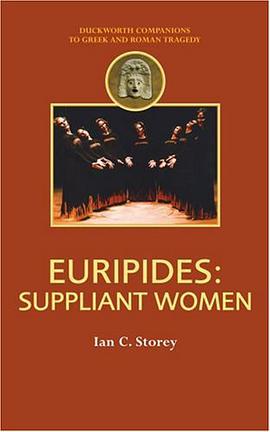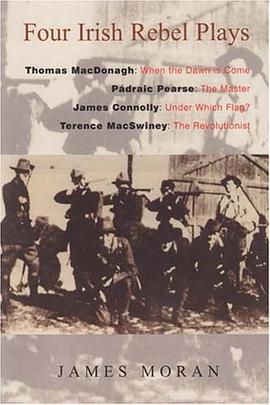

具体描述
"Phoenician Women", one of Euripides' later tragedies, is an intriguing play that arguably displays some of his finest dramatic technique. Rich in cast and varied in incident, it is an example of Euripides' experimentation with structure. It dramatises the most fertile mythical tradition of the city of Thebes and its doomed royal family, focusing in particular on the conflict between Eteocles and Polyneices as a result of their father Oedipus' curse, which eventually leads to mutual fratricide. The play was very popular throughout antiquity, and became part of the so-called "Byzantine Triad" (along with "Hecuba" and "Orestes"), of plays studied in the school curriculum.Thalia Papadopoulou here offers a thorough survey of the play in its historical context, against the background of Athenian tragedy and Euripidean dramaturgy. Employing various critical approaches, she investigates the literary tradition and the dynamics of intertextuality, Euripidean dramatic technique, the use of rhetoric, characterisation, gender, the function of the Chorus, aspects of performance and the reception of the play from antiquity to modern times.
作者简介
目录信息
读后感
评分
评分
评分
评分
用户评价
这本书的语言风格简直是一场华丽的盛宴,充满了古老而又令人惊艳的韵律感。作者的遣词造句考究至极,每一个形容词、每一个动词的选择都仿佛经过了千锤百炼,精准地击中了情感的核心。我发现自己常常不得不停下来,只是为了反复品味那些精妙的比喻和排比,它们不仅是修辞的展示,更是推动情感和意境升华的关键。与其说我在阅读一个故事,不如说我正在沉浸于一场由文字编织而成的、流动且富有张力的梦境之中。这种文字上的高超技艺,使得即便是描写日常琐事的段落,也充满了史诗般的厚重感。对于那些偏爱文学性表达甚于纯粹情节驱动的读者来说,这本书无疑是一座值得反复探索的宝藏。它挑战了我们对叙事清晰度的传统期待,转而追求一种更接近音乐或诗歌的、多层次的审美体验。
评分这部作品的叙事节奏把握得极佳,从开篇的宁静铺陈到中间段落高潮迭起的冲突爆发,再到尾声处那令人深思的余韵,都展现出作者对情节张力的精准控制。故事中的人物群像栩栩如生,尤其几位核心角色的内心挣扎和道德困境,被刻画得入木三分。我尤其欣赏作者在处理复杂人性时的那种毫不留情的坦诚,没有将任何一方塑造成绝对的善或恶,而是让读者在阅读过程中不断审视自己的立场。那些关于命运的沉重探讨,以及对人类在不可抗拒的力量面前所表现出的渺小与坚韧的描写,触动了我内心深处最敏感的神经。读完合上书页的那一刻,我感觉自己仿佛刚经历了一场漫长而深刻的洗礼,世界观在不知不觉中被微妙地拓宽了。那种回味无穷的感觉,使得这本书即便在放下很久之后,依然会在不经意间跳出来,让我重新思考其中的某个场景或某句台词。
评分我必须得说,这本书的主题探讨深刻得令人不安。它毫不留情地撕开了社会外衣下那些关于权力、背叛与救赎的永恒命题。作者对于人性中那些阴暗、矛盾的角落的描摹,精准得像外科手术刀,不留情面地展示了人类在极端压力下的真实反应。特别是对集体无意识与个体良知之间拉锯战的刻画,让我产生了强烈的代入感和反思欲。这不是一本读来让人感到舒适的作品,它的力量恰恰在于它的“刺痛感”,它迫使你走出自己的舒适区,去面对那些不愿承认却又真实存在于人性中的弱点。读完之后,你会发现自己对周围的人和事,乃至对历史的理解,都增添了一层更为复杂和审慎的滤镜。
评分这本书的配乐(如果我可以这么比喻的话)是那种低沉、宏大且持续不断的,它营造了一种令人窒息的氛围感。环境描写和心理侧写完美地融合在一起,背景不再是简单的舞台布景,而是与人物的情绪和命运深度绑定。你几乎可以闻到空气中弥漫的尘土味,感受到那份古老的、无可逃避的宿命感。作者在构建这个世界时所投入的细节考量,使得整个叙事空间具有极强的可信度,仿佛我们真的被带到了那个特定的时空去见证一切的发生。这种沉浸式的体验,远超出了文字本身所能承载的界限,达到了近乎电影般的视听效果,留下的不仅是故事,更是一种难以磨灭的“在场感”。
评分从结构上来说,这本书的布局相当大胆且富有实验性。它似乎有意地打破了传统线性叙事的惯性,采用了多重视角的切换和时间线的交错编织。起初,这种跳跃感让人有些措手不及,需要集中十二分的注意力去拼凑那些碎片化的信息,但一旦适应了作者的节奏,便会发现这种非线性的处理方式极大地增强了悬念和戏剧张力。每一个看似不经意的闪回或预示,都在后续的情节发展中找到了精巧的落点,形成了一种复杂的、相互映照的意义网络。这种结构上的精妙设计,让“真相”的揭示不再是简单的答案公布,而更像是一场层层剥茧、最终指向核心悲剧的智力游戏。这本书无疑要求读者付出思考的努力,但最终的回报是丰厚且令人满足的。
评分 评分 评分 评分 评分相关图书
本站所有内容均为互联网搜索引擎提供的公开搜索信息,本站不存储任何数据与内容,任何内容与数据均与本站无关,如有需要请联系相关搜索引擎包括但不限于百度,google,bing,sogou 等
© 2026 book.wenda123.org All Rights Reserved. 图书目录大全 版权所有




















